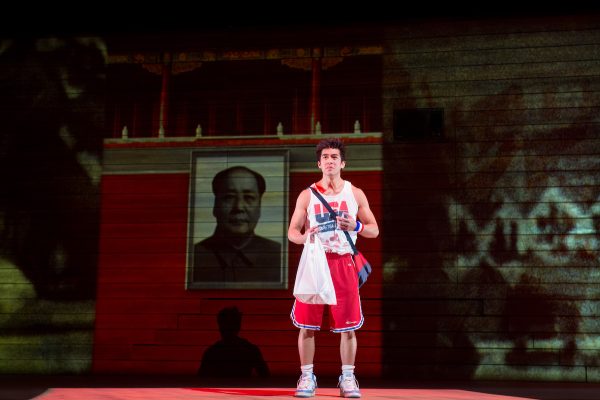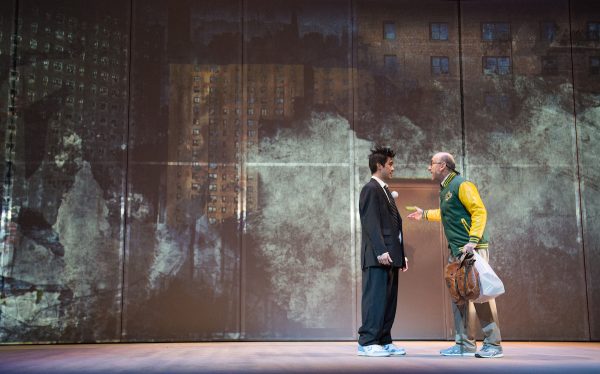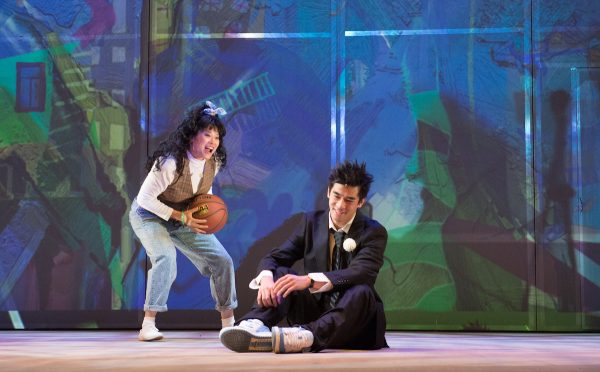I know as much about basketball as I do about astrophysics. Sports are not my thing. So what am I doing reviewing a play about basketball and its gamesmanship?
The simple answer is that Lauren Yee’s The Great Leap, now making a splashy Los Angeles debut at The Pasadena Playhouse in a surging co-production with the city’s East West Players, is not about basketball. Basketball is the frame. Life is what it’s about.
It’s what happens when human encounters unexpectedly derail and people must deal with delicate and nuanced situations that breed unintended consequences. Take that in every sense of the verb. Knowing something about basketball probably adds to the pleasure of seeing this grand production of The Great Leap, but it wouldn’t help at all if you knew nothing about the mystery of human relations.

Great Leap tells the story of a basketball tournament held in Beijing in 1989. The contestants are an American basketball team and a Chinese one, with victory greatly conditioned for the Chinese by the tensions of the simultaneous student uprising in Tiananmen Square. Think patriotism and pride of place as essential to a Chinese win, while more personal circumstances unexpectedly insinuate themselves into the match.
The potentially most valuable player on the American side is a young Chinese American upstart named Manford (the irrepressible Justin Chien), a bright, cocky and stubborn player who talks his way on to the team by refusing to take no for an answer when he approaches the American coach Saul (a wise, open minded yet firm James Eckhouse).

There are reasons why the coach resists, and reasons why Manford persists. Manford’s mother, who spoke little English and whom he considered largely absent from his life, has just died. In no time, his bossy cousin Connie (Christine Lin) has decided to fill the gap by taking charge of Manford, persuading him to not give up on his pursuit of the game.

The political climate in China compels members of the American team to be on their best behavior during those four days in Beijing. But the Chinese coach, Wen Chang (Grant Chang), is watchful and intent on that needed Chinese win. When the hotheaded Manford lands his spot on the team, he also screws up by being in the wrong place at the wrong time — Tiananmen Square. It sets off a sequence of events at least as dramatic as the game itself.
Revealing more of the plot would spoil the fun, but quite aside from Yee’s consistently snappy dialogue and her robust power of argumentation, she provides a propulsive rhythm to the spoken words that parallels the mounting excitement of the Beijing game. A climactic finish to the event, greatly aided by Hana Sooyeon Kim’s uniquely vivid projections, supports the forward thrust of the game, the thrill of the action and the rising roar of the crowd.
The excellent pacing of BD Wong’s direction falters only slightly in this extraordinary sequence. It admittedly depends on a crescendo that makes exceptional theatrical demands when you consider that there is no ball, no crowd and no plays beyond the audience’s willingness to “see” a game in full tilt through the sheer power of suggestion. It’s perhaps as risky as sending a rocket into space.

Scenic and costume design is credited to Lex Liang, while Rebecca Bonebrake is the lighting designer, but it is Kim’s exceptional visual environment and Leon Rothenberg’s sound design that are the major drivers here.
The seemingly endless possibilities of projections are the most exciting new developments in the art of making theatre because, in the right hands, they are endlessly versatile. By manifesting themselves in air and color rather than solid matter, they are visually far more agile at moving a play forward.
In that sense, The Great Leap is a general leap forward for what theatre can do. Twenty-first century standards are changing, and also changing the way that theatre is made. Anything goes as long as it’s done well, with new approaches and novel subjects emerging all the time, and opening up what once was restricted by the confinement of a stage.
Lauren Yee, who gave the world King of the Yees and Cambodian Rock Band and who has received more honors and prizes than she has fingers and toes, certainly has another winner in this Great Leap — a production that could not have matched this success even as recently as 20 years ago.
For the Pasadena Playhouse, however, The Great Leap is not just another winner. It confirms that everything that’s been going right since Producing Artistic Director Danny Feldman took charge of the place some three plus years ago was not by accident, but the fruit of intelligent choices and smart and careful strategy.
Much credit certainly goes to director Wong and to East West Players and its Producing Artistic Director Snehal Desai as well as Mr. Feldman, but above all, to the act of collaboration. Theatre is the most collaborative of the arts and this production is another example of when and why collaborations so often make sense. The beneficiaries are everybody, audiences and creators alike.
Top image: l-r, Justin Chien, Christine Lin, Grant Chang and James Eckhouse in the Pasadena Playhouse & East West Players’ co-production of Lauren Yee’s The Great Leap.
Photos by Jenny Graham
WHAT: The Great Leap
WHERE: The Pasadena Playhouse, 39 So El Molino Ave., Pasadena, CA 91101.
WHEN: Tuesdays-Fridays, 8pm; Saturdays, 2 & 8pm; Sundays 2 & 7pm. Ends Dec. 1.
HOW: Tickets, starting at $25, available by phone at 626.356.7529 or online at pasadenaplayhouse.org, or in person at the theatre box office.
$5 UNDERGROUND PARKING across the street, also more parking in surrounding lots.
RUNNING TIME: Two hours & 20 minutes, with an intermission.
